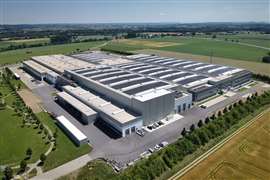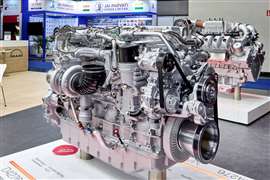Sono Motors talks about its success, next steps
23 December 2022
German startup working to place solar panels on every vehicle
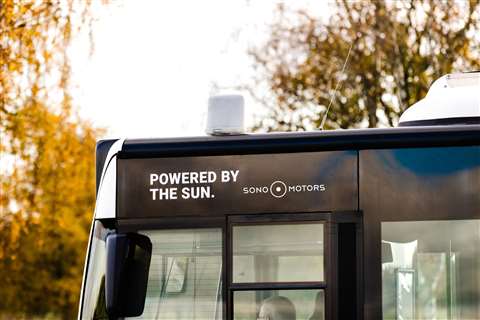 (Photo: Sono Motors)
(Photo: Sono Motors)
Sono Group N.V., a Munich-based startup with a mission to put solar on every vehicle, recently held its first annual general meeting in Amsterdam. During the event, the company’s executive team provided updates on its Sono Motors B2B and B2C ventures over the 12 months since the company went public.
“2022 has been a decisive year for Sono Motors,” said Laurin Hahn, the company’s CEO and co-founder. “Despite the economic and geopolitical challenges, we have grown tremendously in all business areas. We have made significant progress as a company, as a technology provider paving the way for solar on every vehicle.”
The company said it had ten B2B solar partners when it became a pubically traded company in November 2021 and since that time has signed an additional 13. Those include logistics company Rhenus, refrigerated trailer manufacturers Chereau and Mitsubishi Heavy Industries Thermal Transport Europe GmbH as well as truck and bus builder Scania. The company said the network of partners was an important milestone that will diversify its various business pillars (including solar and digital technology) and secue a more financially resilient standing.
Sono Motors said it has 22,000 B2B pre-orders on the books, a 40% increase.
In terms of employees, Sono Motors grew by 82% to 418 employees as of Nov. 30, 2022, of which more than 70% are engineers.
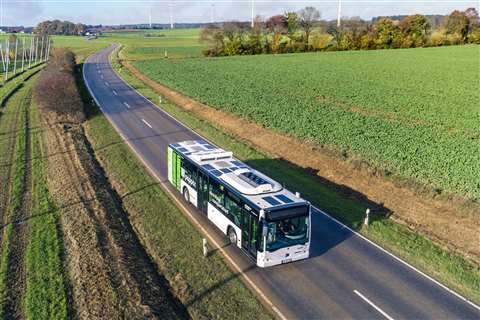 As part of an ongoing collaboration with Pepper Motion GmbH, Sono Motors equipped an electrified Mercedes-Benz Citaro from Pepper’s demo fleet with with a customized version of the Solar Bus Kit containing 14 semi-flexible solar modules to provide around 1.3 kW peak to the 24-volt system. The energy generated by the installation is expected to be 3.3 kWh/day on yearly average based on weather conditions in Munich. (Photo: Sono Motors)
As part of an ongoing collaboration with Pepper Motion GmbH, Sono Motors equipped an electrified Mercedes-Benz Citaro from Pepper’s demo fleet with with a customized version of the Solar Bus Kit containing 14 semi-flexible solar modules to provide around 1.3 kW peak to the 24-volt system. The energy generated by the installation is expected to be 3.3 kWh/day on yearly average based on weather conditions in Munich. (Photo: Sono Motors)
B2B work
Revenue for Sono’s solar business is expected to come from two pillars: its scalable Solar Bus Kit retrofit product, and series integration as it works directly with customers, including fleet operators and OEMs.
The company showed the products during the IAA Transportation trade show in Hanover, Germany, in September. Focused on three industries - buses, electric transporters and refrigerated vehicles, the company said its solar technology was engineered to enable seamless integration into a variety of vehicles.
For box trucks, for example, the company said it is developing flexible and lightweight sandwich body panels that ensure seamless integration and optimal heat-distribution. For refrigerated trailers, it said full solar integration on the roof and sides of the semi-trailer is expected to cover up to 50% of the cooling units’ yearly average energy needs.
A stand-alone product, the Solar Bus Kit, is a scalable retrofit solution designed for the most common 12 m public transport bus types on the European market, such as the Mercedes-Benz Citaro and MAN Lion’s City.
The company said the kit allows subsystems, such as heating, ventilation, and air conditioning (HVAC), to be partially powered by renewable energy. It said it can save up to 1500 L of diesel and up to 4 tonnes of CO2 per bus per year from the approximately 1.4 kW peak installation with about 8 sq m of solar panels. Sono Motors predicted bus fleet operators could see a payback time of approximately 3 to 4 years, depending on days in operation and fuel prices.
“Decision-makers in municipalities and transport companies are under huge pressure to make their fleets emission-free. In addition, they are facing steeply rising energy prices. Therefore, the Solar Bus Kit is the ideal solution to accelerate the transition towards zero-emission vehicles already today,” concludes, said Lars Löhle, Head of Product, Sono Solar.
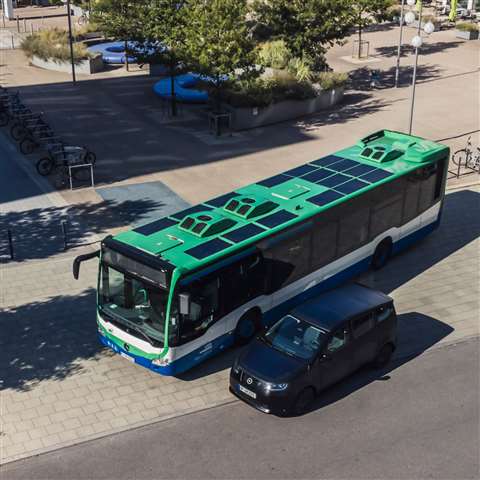 Sono Motors wants to see a solar panel on every vehicle, from automobiles to buses. The company’s Sion solar electric vehicle is shown next to a bus outfitted with its Solar Bus Kit. (Photo: Sono Motors)
Sono Motors wants to see a solar panel on every vehicle, from automobiles to buses. The company’s Sion solar electric vehicle is shown next to a bus outfitted with its Solar Bus Kit. (Photo: Sono Motors)
B2C products
The company also said it has started intensive testing and validation of what it has called the “world’s first affordable solar electric vehicle” (SEV). The Sion automobile incorporates solar body panels and was originally given an initial price of $25,136 thanks in part to contract manufacturing, in this case Finland’s Valmet Automotive. The validation work will involve vehicle dynamics testing, advanced electric testing, crash testing, as well as driving on the German autobahn and long endurance and solar testing in Spain.
The company was certified as an OEM by German federal motor transport authority KBA in July 2022 and achieved incomplete type approval for the Sion at the same time. The company said the KBA’s partial type approval was a major step in preparing the SEV for homologation and high-volume production. The company also expanded partnerships with established companies such as Continental and Bosch.
In October, the company embarked on a U.S. tour with its SEV to demonstrate the technology and gauge interest for future expansion into the U.S.
Unfortunately, Sono Motors also announced that the SEV project was suffering from a “funding gap” that could put an end to the program.
“Financial markets have experienced a negative downturn,” the company wrote in a December 8 press release, “with many tech companies losing up to 90+% of their respective market cap, and shares in mobility tech companies have been hit particularly hard. As a result, financing our Sion program through equity has become increasingly challenging and dilutive. Raising money takes much longer than expected, since we failed to explain to investors why the Sion has the potential to become the world’s first affordable solar-electric vehicle and that there is a huge demand for it.”
The company’s solution was to launch a down payment campaign for 3500 Sion cars, called #saveSion, through which funds would used to move the the car closer to pre-series production. The campaign is currently expected to run for 50 days and is the company’s attempt to raise non-dilutive funding for the majority of the Sion capex program.
“The community’s support enabled us to push the Sion program this far – too far to be shut down. We believe that even a small group of people with a joint idea can change the status quo and that ideas and innovations such as the Sion are needed in times like these,” said Hahn.
About the SEV, Jona Christians, CEO and co-founder of Sono Motors, said, “92% of our suppliers are nominated, 39% of the machines for series production have been ordered. We are planning to set up pre-series shortly and prepare for series production in Finland, testing continues and the homologation is expected to take place; so the Sion is well on its way. Minor changes to the investment plans have resulted in a planned pre-series production in 2023 and planned SOP in the first quarter 2024.”
Into the future
If the down-payment campaign does not go as expected, Sono Motors said it will focus on its proprietary and significantly less capital intensive solar technology business.
Sono Motors also sees an opportunity to license is solar technology: “One of the world’s top global passenger car OEMs signed a purchase order with us,” said Christians. “So we believe the field of technology licensing holds a very promising new market for us. As a company we want to exploit the full potential of our technologies and thus vigorously move forward on our mission of solar on every vehicle.”
The scope of the order is for the delivery of solar body panels, so that Sono Motors and the OEM will be able to explore solar integration into a high-volume vehicle production setting.
POWER SOURCING GUIDE
The trusted reference and buyer’s guide for 83 years
The original “desktop search engine,” guiding nearly 10,000 users in more than 90 countries it is the primary reference for specifications and details on all the components that go into engine systems.
Visit Now
STAY CONNECTED




Receive the information you need when you need it through our world-leading magazines, newsletters and daily briefings.
CONNECT WITH THE TEAM












